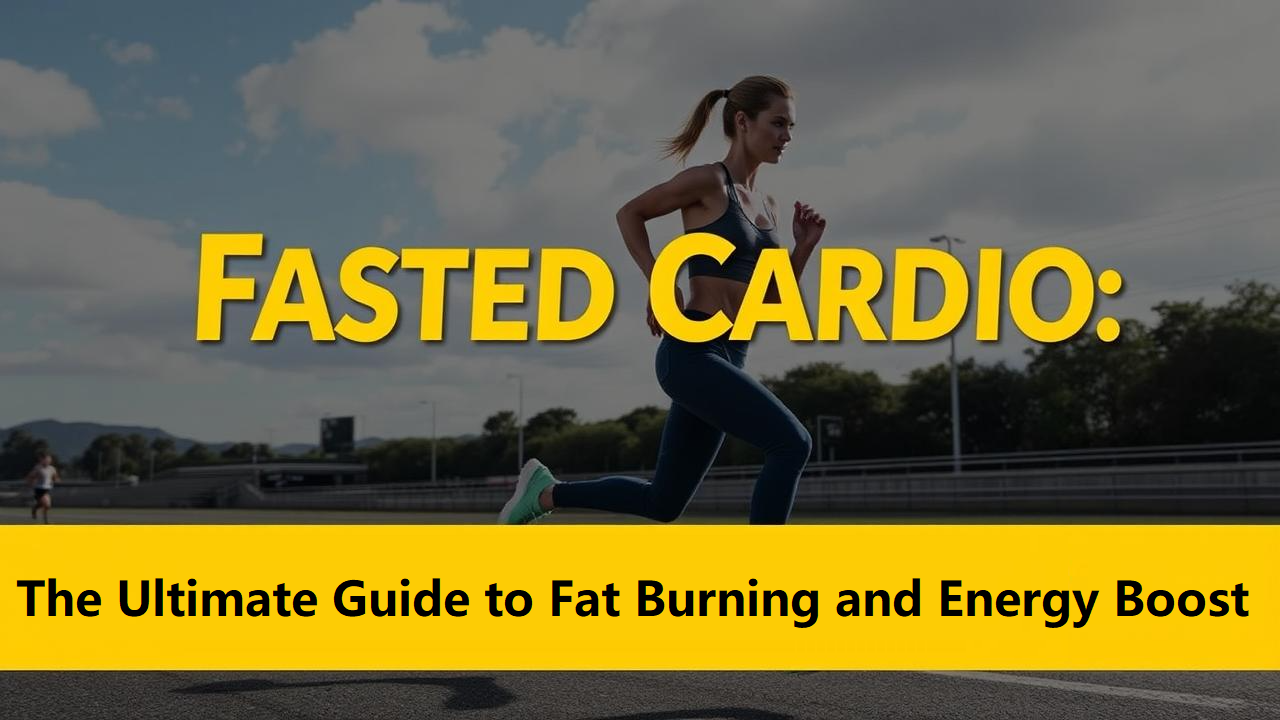Alright, let’s discuss that early morning energy, the rumbling stomach, and if walking (or running) before breakfast is the fat-burning answer. You have probably heard of the term “fasted cardio” in the fitness world, right? Perhaps you have even seen those ultra-disciplined types at the gym at 5 AM, already glistening, while you are still contemplating snoozing your alarm clock.
We’re going to plunge into fasted cardio – what it is, why people are so serious about it, and whether it is actually worth it or not. Don’t fret – we are not going to use a lot of fancy terms or anything like that. This should be more like a casual discussion with a buddy who is also pursuing some of the same gains.

What is Fasting Cardio, Anyway?
Fasting cardio is simply doing your cardio workout (running, cycling, brisk walking, swimming– your choice) without eating! We mean no overnight oats, no banana before a workout, not even a sneaky protein bar. You roll out of bed, maybe drink some water, and then get moving.
Fasted cardio means exercising on an empty stomach. The general idea is that after 8-12 hours asleep (and without eating) your body has very little glycogen stores (the carbohydrates that are quickly available for energy). Therefore, after not using quick energy from carbs for a long period, your body is forced to use fat for energy while working out. Sounds pretty cool for fat loss, right?
The “Why”: Explanation of the Theory
Think of your body as a car. When your car is full of gas (you’ve just eaten carbs) it utilizes that fresh fuel first. If you have been driving your car for a while and are running low on gas, it will have to find an alternative and use what is available (its reserve tank) by drawing from the fuel as needed, to maintain its activity.
When glycogen levels are low, our body’s fat-burning machinery is activated more so than when glycogen is abundant. Further to that, some study has shown that while exercising in a fasted state, we also have slightly elevated levels of certain hormones; specifically growth hormone and catecholamines (think adrenaline). These hormones are inherently designed to mobilize fat stores to be utilized as energy.
It’s this combination of depleted glycogen and increased fat-mobilizing hormones that makes fasted cardio attractive for someone who wants to lose that extra few pounds of fat.
The Good Stuff: Potential Benefits
Okay, let’s dive into the reasons for fasted cardio that people may do this:
1.Possibly Enhanced Fat Burning: This is the big one. The hypothesis is plausible: when your body has less sugar available to use immediately, it is more likely to burn fat during your exercise. A number of people will tell you they feel “leaner” when doing this consistently.
2.Metabolically Adapted: Over time, the belief is that training in fasted state regularly will help your body learn to utilize fat for fuel more efficiently, even if you are not actually fasting. This is called metabolic flexibility, which is a fancy way of saying your body gets smart about fuel usage.
3.Time-Efficient and Routine: For morning people, getting your fasted cardio in before a day has started can be a major win. You are not having to factor in the digestion time pre-workout, and you have accomplished a major fitness goal before most people are even on their first cup of coffee. It also forces you to have a productive approach to your day!
4.You Are Awakened: Some people are woke and feel particularly tuned in and clear after a fasted morning workout. This can be an incredible way to wake up not only your body, but other systems as well. I have definitely experienced more than a day or two when a fasted morning run feels like pressing the reset button.

Note: Possible Negatives & Things to Consider
So first, before you set your alarm clock for four in the morning and tell breakfast to hit the road, let’s talk about the other side of the story. Fasted cardio is not a magic bullet and it is not for absolutely everyone:
- Losing muscle (If done wrong): The somewhat famous muscle loss reaction is the most typical concern. Your body certainly prefers to burn fat when glycogen is lower, but if you do wrong things — such as working too hard or hard too long, your body might just then turn to nightmare and start breaking down muscle protein, too. We do NOT want that to happen! Typically, the muscle loss reaction is most prevalent in high-intensity fasted workouts.
- Reduced performance & energy: Let’s face it, it’s not always very fun to try working out on fumes. Sure, there are some people who can hustle on empty and not be too worse for ware, but you likely can agree largely that, you will “feel” weaker, slower, and have less “ampling” than if you had something in the tank. However, if your only goal is to just perform at a high level (for example, break a PR), fasted may be a poor choice?
- Sustainability & Enjoyment: If working out on an empty stomach makes gives you that feeling like you are going to vomit, feel aberrant (nausea and/or dizziness) or just miserable, it probably is not going to work. The biggest factor in working out is consistency. If you really dislike working out, then how can you stick with doing it?
- Hypoglycemia (Blood Sugar): In certain cases, especially for some individuals with definite medical reasons Working out in a fasted state can cause hypoglycemia, and your blood sugar can drop so low, you may be feeling dizziness, weakness, and possibly fainting! As always listen to your body!
- Not Necessarily Better for Fat Loss: Here is the kicker, for fat loss overall, the biggest factor is your total calorie deficit over time. Fasted cardio may or may not burn more fat right at that moment in time, but remember your body adapts throughout the day. Some studies show that the difference in total fat oxidation (burn) over a full 24-hour period might be so slight for some people that it becomes virtually irrelevant. The real idea is about the bigger picture.
How to enter it (safely)
In case you‘re still interested, and want to dip your toes in, for fasted cardio here are a few rules on how to do so safely:
1. Hydrate, Hydrate, Hydrate: Before you do anything hydrate, with a large glass of water (maybe even two!). Most likely you will wake up in a dehydrated state. A little black coffee or green tea as well should not break your fast.
2.Low to Moderate Intensity: If you only take away one thing from this section, this is it! You really just want to think about brisk walking, low intensity jogging, low intensity cycling, or an elliptical machine at a conversational pace. Trying anything more intense, HIIT, heavy weights, etc. on an empty stomach greatly increases muscle breakdown, and would probably feel terrible.
3.Duration: Aim for 20-45 min… anything longer than that increases risk of muscle breakdown and you may feel wiped out when you’re finished.
4.Listen to Your Body… Seriously! If you feel dizzy, start to feel nauseous, or feel unusually weak, stop! There is nothing wrong with quitting early or eating a quick banana… your health is what matters.
5.Break Your Fast Smart: After your workout you really want to prioritize protein to get the muscle recovery started and halt any further muscle breakdown. If you are physically still recovering (from either endurance or mostly weight training) feel free to also prioritize some healthy carbs to help replenish your energy stores.
Is Fasted Cardio Right For YOU?
This is where the fun begins with fasted cardio – recognizing that fitness is very personal:
- It could be right for you if: You’re looking for a slight edge for fat loss (even more important if you’re already fit), you like the early morning workouts, you live a busy lifestyle and want to get it done and out of the way, and you’re good with lower intensity cardio.
- It could NOT be right for you if: You’re completely new to exercising, your main goal is performance or muscle gain, you feel horrible exercising on an empty stomach, or you have any health issues (always consult a doctor!).

My Two Cents
I’ve tried fasted cardio myself. Some days it feels amazing, like I’m really ramping up my metabolism and mental clarity, other days it feels awful, like I’m running on fumes, and my workout suffers. What I learned was it is a tool, it is not the tool. You can’t get too hung up on ‘fitness tools. ‘It is one tool in your fitness kit and sometimes it fits and other times it doesn’t.
At the end of the day, consistency and whole nutrition and recovery with quality sleep and a great workout you love will outpace whether you eat a toast before your run. Try, feel your body, find what feels good and do it! Have fun!
Read more articles with Cardio and Endurance :- Cardiovascular Endurance Training


